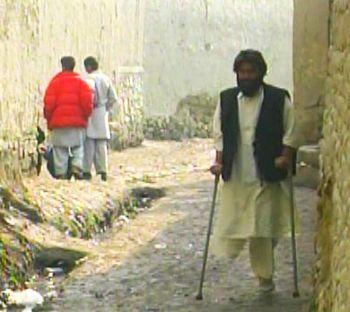
Publisher:
Bonnie King
CONTACT:
Newsroom@Salem-news.com
Advertising:
Adsales@Salem-news.com

~Truth~
~Justice~
~Peace~
TJP
Jul-13-2008 18:51

 TweetFollow @OregonNews
TweetFollow @OregonNews
Afghan Play Raises Ghosts of Brutal Past
By Thibauld Malterre Special to Salem-News.comThere have been a handful of performances in Kabul and other cities across Afghanistan.
 Man with one leg in a Kabul, Afghanistan alley; his plight is anything but uncommon in this war weary country. Photo by Tim King Salem-News.com |
(BAMIYAN, Afghanistan (AFP)) - Unsure, Sardar takes his head in his hands: should he undergo the operation that will enable him to express the horrors of Afghanistan's past 30 years at the risk of reviving unbearable pain?
Around the character of the patient in a hospital, props illustrate the bloodshed and destruction: bits of flesh that attract flies, guns, rolls of barbed wire, bottles filled with blood.
The one-man play, the first here that tackles the brutality of Afghanistan's recent past, was recently performed against the backdrop of massive empty niches that once held ancient statues of the Buddha, blown up by the Taliban in 2001 as "unIslamic."
It is the medium the UN mission and Afghanistan Independent Human Rights Council (AIHRC) think is the most effective to confront history and raise calls for justice, which they say are necessary for the country to heal.
"We had a lot of seminars, workshops and speeches before," local AIHRC official Abdul Ahad Farzam said.
"But we really want to address the people. A lot of them can't read, can't write ... so we got this idea to make a show, a theatre performance."
In Bamiyan, central Afghanistan, the audience of about 100 people, including relatives of victims, was transfixed.
Turbaned elders sat with their mouths hanging open; women in burqas stretched their necks to see better.
Called AH-7808, a reference to the period 1978 to 2008, the play focuses on Sardar's desire for the truth as he is confronted by voices of ghosts of victims of the violence.
The voice of a young girl blown up by a car bomb says, "Now I ponder who did this, Killed me with their bomber's kiss, Broke me so they might be free, Did they ask this price of me?"
A forgotten mujahedin killed fighting Soviet invaders, a Taliban from Kandahar in the south who dies in the north fighting for a commander who does not practise what he preaches -- they all ask only that their suffering be recognised so they can rest in peace.
If these voices resonate with the audience, it is likely because in them they recognise their loved ones whose photos are displayed around the makeshift theatre.
"People used us, we were made to kill our own brothers. There has been enough violence for political and ethnic reasons," said Mohammad Wakhil, 63, whose father, two brothers and two uncles were arrested in 1979 by the communist regime.
"I did not hear from them again but one day I saw on television pictures of a mass grave and I know they were forced into it," he said after the play.
As the stories of such atrocities are recounted by the "ghosts", Sardar bit by bit removes a white hood hiding his face, a hospital gown, ropes binding his hands.
His decision on whether to have the truth-expressing operation is not made clear, left to the opinions of the spectators.
During the interval and afterwards, the audience are asked for their impressions.
The actor is shown as tied up because "he is like a prisoner, the bonds speak to us of Sardar's internal pain," said one woman.
Others spoke of their own experiences.
One woman said when she was 15 she saw 10 people killed in front of her. She never found out why. And the memory still haunts her.
"We cannot get away from what we saw, the violence, the people who died are in our minds all the time," said another woman.
"We have to find a way to answer simple questions: who killed my family? Why? Who gave the order?"
Like most Afghans, the actor who plays Sardar also has his own story.
"When I saw the script I immediately asked to be able to play this role in memory of a friend with whom I was kidnapped as we were going to a wedding," he said after his performance.
"The armed men cut his throat and showed me his head before letting me go," he said.
UN official Norah Niland said accepting the past was a step towards moving on.
"You cannot undo the past but acknowledging what happened is a first step to put an end to an history of suffering and pain," she said.
"There are no models, and every country has to find its own way to deal with the problem," said Niland, referring to truth and reconciliation processes in South Africa, Northern Ireland and Cambodia.
Her sentiments are echoed by Musa Sultani, from the AIHRC.
Afghans cannot embrace their future with confidence unless they are freed from their past, she said.
"The victims must have their voices heard, claim justice and put pressure on the state to launch a national debate," Sultani added.
In Bamiyan, the show is over. There have been a handful of performances in Kabul and other cities across Afghanistan.
But whether they will help to meet Afghans' thirst for justice remains to be seen. Many of the warlords accused of atrocities in now in parliament, where they have voted in an amnesty law to protect themselves.
Articles for July 12, 2008 | Articles for July 13, 2008 | Articles for July 14, 2008
Salem-News.com:

Quick Links
DINING
Willamette UniversityGoudy Commons Cafe
Dine on the Queen
Willamette Queen Sternwheeler
MUST SEE SALEM
Oregon Capitol ToursCapitol History Gateway
Willamette River Ride
Willamette Queen Sternwheeler
Historic Home Tours:
Deepwood Museum
The Bush House
Gaiety Hollow Garden
AUCTIONS - APPRAISALS
Auction Masters & AppraisalsCONSTRUCTION SERVICES
Roofing and ContractingSheridan, Ore.
ONLINE SHOPPING
Special Occasion DressesAdvertise with Salem-News
Contact:AdSales@Salem-News.com



Terms of Service | Privacy Policy

All comments and messages are approved by people and self promotional links or unacceptable comments are denied.
[Return to Top]
©2026 Salem-News.com. All opinions expressed in this article are those of the author and do not necessarily reflect those of Salem-News.com.